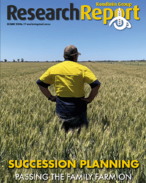This article is 1 year old. Images might not display.
Thinking outside the box and diversifying his farm production with a focus on the future has earned Mark Foletta the 2023 Award for Excellence in Diversification and Sustainability, sponsored by Corteva Agriscience.
Mark manages a 450ha traditional farming enterprise 12 km south of Benalla in northeast Victoria along with his own 10ha of high-value horticultural land. Together with his father, Mark produces Angus cattle, prime lambs and Merino wool, as well as wine grapes and lucerne.
In recent years Mark has diversified, successfully applying for the first Victorian licence to harvest one-to-two tonnes of wild mushrooms annually, and planting two hectares of cherry trees and almost a hectare to heritage pumpkin varieties.
Mark's commitment to overall farm health and producing quality food, combined with the close relationships he has built with his customers, especially buyers who have sustainability at front and centre of their business activities, impressed the judges.
Dan Dixon, ANZ Marketing Director at Corteva Agriscience, sponsor of the 2023 Award for Excellence in Diversification and Sustainability at the annual Farmer of the Year Awards, said Mark's approach to his farm's health was exemplary.
"Mark has gone above and beyond to ensure his farm is meeting the goals of overall production sustainability and designs his management processes to align with the needs of the market. The results of his focus on farm health go hand-in-hand with his achievements.
"This is an award Corteva is so proud to support because we have placed sustainability at the heart of our vision, including in research and development, with a goal to have 100 per cent of products in our pipeline meeting key criteria for sustainability by 2025."
Mark says he takes a holistic approach to farming and is driven to explore new avenues of production.
"I practice regenerative agriculture with the aim of increasing soil carbon and improving soil health, and I aim to optimise the use of products which would otherwise be seen as ‘waste', which led me to develop our paddock-to-plate enterprise," he said.
"I provide notable restaurants in Melbourne with cherry wood for smoking meats, as well as on-selling wine made from my grapes to restaurants, local purveyors, and a company focused on re-fillable bottles. The aim of encouraging paddock-to-plate sales is to not only boost the region's offerings, but to provide more traceability for consumers. Knowing where our food is coming from and how it's being produced is gaining popularity and is something I support."
With the goal of providing a positive environmental, social and economic impact, Mark began a program in 2009 to successfully improve his pasture by eliminating chemical nutrition and using a dry blend of organic soil conditioners on his highly acidic soils.
This resulted in a change to the composition of the pasture to reduce weeds such as silver grass and capeweed, and also reduced insect pressure. Ten years later the Cation Exchange Capacity, which measures the ability of the soil to hold nutrients, had increased by 30% and soil carbon had increased by 56%.
Along with time-controlled grazing to help improve mineral cycles, the building of soil health has increased overall carrying capacity on the farm by 20%.
Mark uses green waste and spent mushroom compost as an organic adjunct instead of synthetic fertilisers on his heirloom pumpkins and cherry orchard. To ensure the vineyard continues to perform well, Mark utilises under-vine maintenance equipment to reduce weeds, while an investment in centre pivot irrigation has doubled his annual output of silage and hay.
Another project is the planting of 2,000 mountain eucalypts for use in medical research, as Mark willingly seeks out complementary industries for agriculture in the region.
Other young farmers often seek him out for advice.
"I enjoy the opportunity to share what I have learned with other farmers and encourage them to review their own management strategies on farm," Mark said.
"If we want to continue farming into the future, we have to consider what that future might look like, and how we might look in it."






















